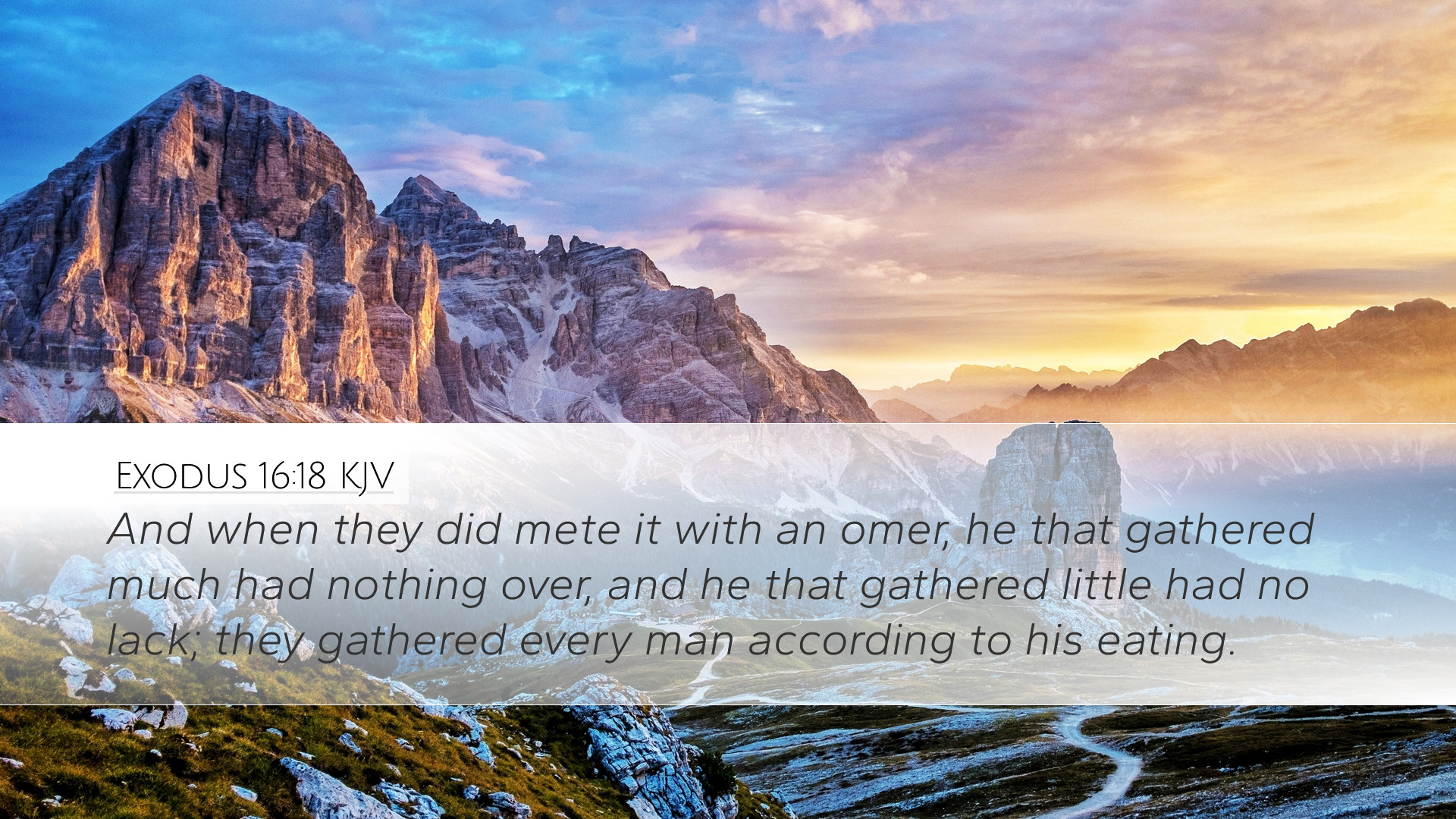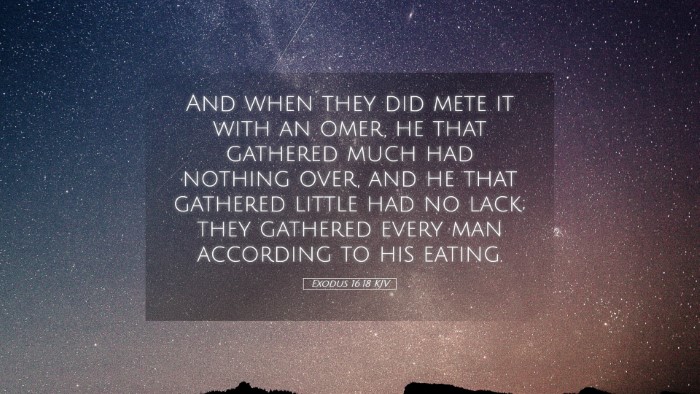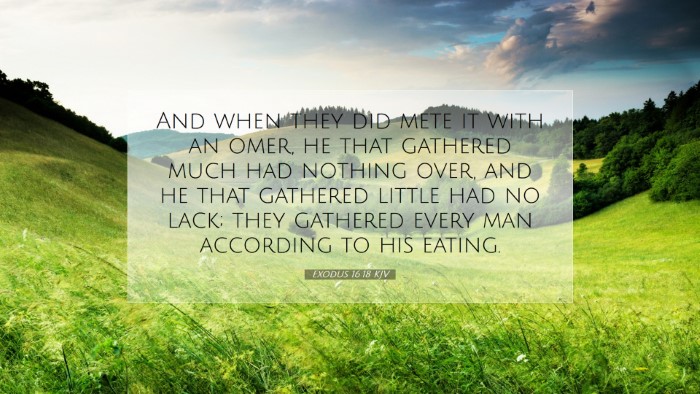Exodus 16:18 Commentary
Bible Verse: "And when they did mete it with an omer, he that gathered much had nothing over, and he that gathered little had no lack; they gathered every man according to his eating." (Exodus 16:18, KJV)
Introduction
The narrative of Exodus 16 unfolds during a pivotal time for the Israelites as they journey through the wilderness. The provision of manna serves as a profound illustration of God's faithfulness and the principles of reliance and community among His people. Exodus 16:18 particularly highlights the divine instruction regarding the gathering of manna, emphasizing the sufficiency of God's provision for all.
Analysis and Commentary
This verse reveals several key insights that are significant for theological reflection, communal living, and the understanding of divine provision.
1. Sufficiency and Divine Provision
Matthew Henry emphasizes that the divine supply of manna was sufficient for every household. The fact that those who gathered much did not have excess while those who gathered little did not suffer want illustrates God's perfect economy of provision. Henry highlights the principle that God ensures that all His people are adequately taken care of, pointing to His intimate knowledge of each individual's needs.
Furthermore, Albert Barnes notes that this arrangement reflects God's justice and mercy. The equality in gathering signifies that God's provisions are tailored to each person's family needs rather than their personal ambition or strength. In God's kingdom, there is no lack for those who trust in Him, and His justice accounts for the disparities in human ability.
2. Community and Interdependence
Adam Clarke draws attention to the collective nature of this gathering process, underscoring a theme of interdependence within the community of faith. Each individual’s collection contributed to the communal sustenance. Clarke posits that this model fosters unity among the Israelites; none are exempt from the responsibility of gathering, thereby promoting a spirit of cooperation and mutual support.
This principle can be paralleled in the church today, where each member's contributions—be it spiritual gifts, resources, or service—are essential to the body as a whole. Paul’s teaching in 1 Corinthians 12 about the body of Christ resonates with this gathering principle: every part has its role, and when functioning together, the body thrives.
3. Faith and Obedience
The gathering of manna necessitated both faith and obedience from the Israelites. Matthew Henry elaborates on the idea that God's commands must be followed with diligence. Each day, the people were required to trust in God for their daily bread, as they could not store manna; it would spoil. This daily dependence points to the model of prayer taught by Jesus in the Lord's Prayer: “Give us this day our daily bread.”
Albert Barnes further stresses the importance of obedience in how the Israelites were to gather the manna according to God’s instructions. Failure to do so resulted in waste or spoilage. This can lead to deeper reflection on how believers today can sometimes fall into the trap of seeking spiritual sustenance outside of God's commands, only to find it lacking and unsatisfactory.
4. Spiritual Nourishment
Exodus 16 serves as a prefiguration of spiritual nourishment found in Christ, who identifies Himself as the "bread of life" (John 6:35). Adam Clarke draws a critical connection between the physical bread from heaven (manna) and the spiritual sustenance offered in Christ. Just as the Israelites had to gather manna regularly, believers are called to seek Christ continually and partake in His grace for spiritual sustenance.
This foreshadowing serves as a theological reflection on the sacramental nature of communion, emphasizing the necessity of consuming the Bread of Life to maintain spiritual vitality. Pastors and theologians can explore these parallels as they teach about spiritual dependence on Christ in the same way the Israelites depended on manna.
5. Lessons for Today
- Dependence on God: Exodus 16:18 teaches the necessity of trusting God for daily needs. This is vital for believers living in an age where self-sufficiency is prized over reliance on divine provision.
- Equity in Community: The communal aspect underscores the importance of sharing resources and helping one another within the body of Christ, fostering an atmosphere of unity and support.
- Obedience to God's Word: Adherence to God's commands ensures that believers experience His abundance. This requires disciplined and faithful living.
- Spiritual Practices: Just as the Israelites physically gathered manna, today's Christians are encouraged to 'gather' spiritually through prayer, scripture reading, and community gatherings.
Conclusion
Exodus 16:18 stands as a rich source for theological reflection on God's provision, community, faith, and obedience. The profound simplicity of gathering manna invites believers to reconsider their relationship with God and one another, calling them into a deeper reliance on His sufficiency. These insights drawn from public domain commentaries prompt pastors, theologians, and students alike to delve into the richness of God’s Word, illuminating the lessons contained in scripture for contemporary faith communities.


